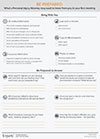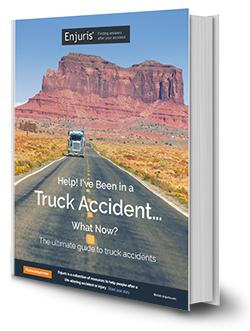Find out how to recover damages (compensation) when a big rig is involved
The average size of a large commercial truck (sometimes called a "tractor-trailer" or "18-wheeler") in the United States is 72 feet long, 13.5 feet tall, and 8.5 feet wide. What's more, large commercial trucks can weigh up to 80,000 pounds.
The substantial size of commercial trucks makes them more susceptible to certain types of accidents. Unsurprisingly, accidents involving commercial trucks are often catastrophic.
If you've been injured in a large commercial truck accident in South Carolina, you probably have questions about who's liable and how you can recover damages. In this article, we'll do our best to answer these and other common questions.
Truck accident statistics
Are large commercial truck accidents common?
Large commercial trucks crash less often in South Carolina than other vehicles, but they tend to cause severe injuries when they do wreck.
What's more, the total number of reported truck accidents in South Carolina have risen steadily in recent years, as the data below shows.
| South Carolina tractor-trailer crashes (2014-2018) | ||||
|---|---|---|---|---|
| Truck type | Fatal crash | Injury crash | Property-damage-only crash | Total crashes |
| 2014 | 41 | 850 | 2,909 | 3,800 |
| 2015 | 71 | 1,034 | 3,314 | 4,419 |
| 2016 | 68 | 1,111 | 3,645 | 4,824 |
| 2017 | 59 | 1,125 | 3,802 | 4,986 |
| 2018 | 80 | 1,121 | 3,958 | 5,159 |
Source: South Carolina Department of Public Safety
In the U.S., there were nearly 500,000 police-reported crashes involving large trucks in 2018. Of those crashes, 4,415 were fatal crashes (a 27% increase from 2010) and 107,000 resulted in serious injuries.
What are the causes of truck accidents?
The same things that cause car accidents can cause truck accidents, including:
- Distracted driving
- Speeding
- Failure to obey traffic signs
- Dangerous lane changes
- Overcorrection and other decision errors
- Poor road conditions
- Poor weather conditions
The Federal Motor Carrier Safety Administration (FMCSA) found that most large truck accidents are caused by speeding, followed by distracted driving.
Additionally, there are some specific situations that often lead to large truck accidents:
- Jackknife accidents. A jackknife accident occurs when the cab and trailer portions of a large truck fold at the joint. When this happens, the driver no longer has control over the vehicle.
- Tire blowout accidents. Both cars and trucks have tire blowouts. However, truck tires are massive and tire blowouts often result in tire debris striking other cars.
- Unsecured load accidents. Federal laws require cargo to be immobile and secure. Nevertheless, unsecured load accidents can happen when a load isn't secured properly or the instability of an unsecured load causes the truck to move unpredictably.
- Hazmat truck accident. The term "hazmat" refers to hazardous materials, which include everything from gasoline to lithium batteries. An accident involving a truck carrying hazardous materials can affect the drivers on the road, as well as anyone in the surrounding areas.
What laws govern truck accidents?
The trucking industry is regulated by both federal and state governments. Federal laws establish certain standards that trucking companies and drivers must meet. The vast majority of federal regulations can be found in Title 49 of the Code of Federal Regulations and cover things like:
- Maximum vehicle weight
- Transportation of hazardous materials
- Drug and alcohol testing
- Licensing requirements
- Inspections
- Emergency signal equipment
- Use of smartphones and other hand-held devices (they're strictly prohibited)
The South Carolina Department of Transportation has its own set of trucking regulations that provide additional requirements concerning things like licensing and obtaining oversized load permits.
How do I establish liability after a truck accident in South Carolina?
There are a number of parties who may be at fault for a truck accident in South Carolina, including:
- The truck driver
- The owner of the truck
- The company that leased the truck from the owner
- The manufacturer of the truck or truck components
- The person who loaded the truck's cargo
Proving negligence in a truck accident isn't all that different than proving negligence in a car accident. However, there are a couple of important procedural differences to keep in mind when filing a lawsuit after a truck accident.
- Respondeat superior. The doctrine of respondeat superior allows you to hold an employer liable for the negligent acts of their employees. In most cases, the truck driver who caused your crash is employed by a trucking company. That means, under the doctrine of respondeat superior, you can sue the trucking company, which typically increases your chances of recovering damages (given that trucking companies usually have more money and insurance than their employees).
- Jurisdiction. In most cases, you must file a personal injury lawsuit in the county where the defendant lives or in the county where the accident occurred. When suing a trucking company, however, you can typically file a lawsuit wherever the company does business, as well as where the accident occurred.
Leroy sued both Alvino and his employer, seeking to hold Kelly Trucking Company liable for Alvino's negligence through the doctrine of respondeat superior. Additionally, Leroy asserted a separate cause of action against Kelly Trucking Company for negligent hiring based on Alvino's poor driving record.
The court awarded Leroy actual and punitive damages.
What if I'm partially at fault for my truck accident?
It's not always the case that only 1 party is responsible for an accident. Sometimes, both the plaintiff and the defendant played a role in the crash.
Let's look at an example:
Joan is driving behind a large commercial truck that is transporting piping. Joan, frustrated that the truck is moving so slow, begins to tailgate the truck.
Unbeknownst to Joan, the truck driver did not properly tie down the piping. As a result, one of the pipes slips free and strikes the front of Joan's car, causing her to crash.
Joan suffers serious injuries and sues the truck driver for $10 million.
The court finds that the truck driver was 80% at fault for the accident for failing to properly secure his cargo. The court also finds that Joan may have been able to avoid being hit by the pipe had she not been following so closely. As a result, the court finds that Joan was 20% at fault for the accident.
Under South Carolina's modified comparative fault rule, Joan can only recover $8 million of her damages.
How long do I have to file a truck accident lawsuit in South Carolina?
South Carolina has a statute of limitations that dictates how long you have to file a personal injury or auto accident lawsuit. If you fail to file your lawsuit within the allotted time, you are forever barred from filing the lawsuit.
If, however, you sue the government, you must do so under the South Carolina Tort Claims Act, which reduces the statute of limitations to 2 years (although it can be extended to 3 years if you file a verified claim for damages within 1 year).
Do I need to file a lawsuit?
When a truck driver is at-fault for a truck accident, their insurance company is responsible for paying the medical expenses and property damage of the injured person. As a result, you can recover damages by filing an insurance claim against the truck driver in lieu of a lawsuit.
There are, however, a few things to keep in mind when attempting to recover damages from an insurance company:
- Insurance policies have limits. If your damages exceed the at-fault driver's policy limits, you'll need to file a personal injury lawsuit against the at-fault driver to collect any amount of damages in excess of the policy limits.
- First offers are generally low offers. Insurance companies are in the business of making money. Although an insurance adjuster might be sympathetic to your situation, their job is to pay you as little as possible. As a result, it's almost never a good idea to accept the initial settlement offer from an insurance company.
- You can't file a lawsuit after signing a settlement agreement. If you sign a settlement agreement, you give up your right to file a lawsuit in the future. This is an important consideration given that the true cost of some injuries isn't clear until months after an accident.
For the above reasons, it's almost always a good idea to consult with an attorney before negotiating with (or at least before settling with) an insurance company.
What damages can I recover after a truck accident?
In South Carolina large truck accident cases, plaintiffs can recover 3 types of damages:
- Economic damages include the monetary losses caused by the accident (medical expenses, lost wages, property damage)
- Non-economic damages include the non-monetary losses caused by the accident (pain and suffering, emotional distress, loss of consortium)
- Punitive damages are meant to punish the defendant and are only available in cases where the defendant acted willfully or recklessly
How do I find a truck accident lawyer?
Truck accident litigation can last months or even years. For this reason, it's important to find a qualified attorney, but also an attorney with whom you get along.
Not long ago, people found attorneys by flipping through the yellow pages. Today, most people find attorneys using online directories. Here are 2 free online directories to consider when searching for a truck accident lawyer near you:
Once you've located a couple of potential attorneys, it's a good idea to meet with them face-to-face to make sure you find the right fit. Most initial consultations are free.

A worksheet to prepare for your first meeting with a personal injury attorney – what to bring, what they'll ask
Download in PDF format
What if I can't afford an attorney?
Too often, people injured in truck accidents attempt to handle claims themselves because they assume they can't afford an attorney. However, most personal injury cases are handled on a contingency fee basis. This means that you don't pay your attorney anything unless and until you recover damages (through a settlement or verdict), at which point your attorney takes a certain percentage (usually 20-40%).
Additionally, if you meet federally established poverty guidelines, you may qualify for free legal help through the South Carolina Bar Pro Bono Program.
Did you know that truck accident law varies by state?
Need a lawyer?
What does an injury lawyer do?
A personal injury lawyer helps individuals who have sustained injuries in accidents to recover financial compensation. These funds are often needed to pay for medical treatment, make up for lost wages and provide compensation for injuries suffered. Sometimes a case that seems simple at first may become more complicated. In these cases, consider hiring an experienced personal injury lawyer. Read more















